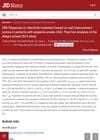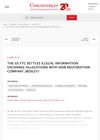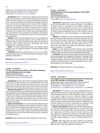24 citations,
June 2013 in “Journal of neuroendocrinology” Neuroactive steroids and the enzyme 5α-reductase might be involved in the development of Tourette's syndrome.
15 citations,
November 2018 in “Current radiopharmaceuticals” Melatonin can help prevent and treat skin damage caused by gamma rays.
13 citations,
August 1991 in “The Journal of the American Osteopathic Association”  10 citations,
April 2015 in “PubMed”
10 citations,
April 2015 in “PubMed” Rosemary oil and minoxidil 2% both effectively increase hair count in people with androgenetic alopecia, but rosemary oil causes less scalp itching.
4 citations,
July 2019 in “Vestnik Rossiĭskoĭ akademii meditsinskikh nauk / Rossiĭskaia akademiia meditsinskikh nauk” Both genetics and lifestyle factors contribute to male pattern baldness.
 1 citations,
January 2023 in “Journal of cosmetic dermatology”
1 citations,
January 2023 in “Journal of cosmetic dermatology” Combining CO2 laser with platelet-rich plasma is more effective for treating acne scars than laser alone.
 1 citations,
August 2022 in “BMC Plant Biology”
1 citations,
August 2022 in “BMC Plant Biology” Melatonin helps broccoli roots produce anti-cancer compounds by controlling nitric oxide and hydrogen peroxide levels.
 August 2024 in “PLoS ONE”
August 2024 in “PLoS ONE” Younger Jordanians know more about rosemary, often using it for hair and stomach issues.
 May 2023 in “Vestnik dermatologii i venerologii”
May 2023 in “Vestnik dermatologii i venerologii” Early-stage male pattern baldness shows two types of hair loss: one on the top of the head linked to hormonal changes, and another at the back of the head. The top hair loss responds well to specific treatment, while the back hair loss does not.
December 2021 in “Vestnik Rossiĭskoĭ akademii meditsinskikh nauk / Rossiĭskaia akademiia meditsinskikh nauk” Personalized vitamin and trace element treatment improves hair density and reduces hair loss in men with early-stage androgenic alopecia.
6 citations,
November 2018 in “American journal of transplantation” UV light helped human hair transplants survive in mice without broad immunosuppression.
 25 citations,
November 2001 in “Kidney International”
25 citations,
November 2001 in “Kidney International” Male hormones worsen kidney transplant damage, but blocking them helps.
 10 citations,
June 2019 in “Aesthetic Plastic Surgery”
10 citations,
June 2019 in “Aesthetic Plastic Surgery” Amniotic allograft may be more effective than platelet-rich plasma for midface aging treatment.
 2 citations,
May 2022 in “JAAD case reports”
2 citations,
May 2022 in “JAAD case reports” Using powdered umbilical remnant allograft can effectively treat chronic scalp wounds resistant to traditional treatments.
 March 2024 in “Authorea (Authorea)”
March 2024 in “Authorea (Authorea)” Using lyopreserved umbilical tissue allograft may improve healing and reduce recurrence of pilonidal cysts.
April 2016 in “The journal of investigative dermatology/Journal of investigative dermatology” Combining UVB irradiation and anti-CD154 antibody improves hair follicle transplant survival.
December 2022 in “Stem Cells and Development” Exosomes from stem cells help improve nerve repair in rats.
4 citations,
September 2012 in “Transplant international” Graft rejection in a hand transplant may trigger hair loss due to autoimmune responses.
 April 2023 in “The journal of investigative dermatology/Journal of investigative dermatology”
April 2023 in “The journal of investigative dermatology/Journal of investigative dermatology” Ritlecitinib significantly improves scalp hair regrowth in alopecia areata patients over time.
 April 2013 in “e-Competitions Bulletin”
April 2013 in “e-Competitions Bulletin” In 2013, the FTC settled with hair company Bosley over claims it illegally shared business information with a competitor.
 September 2023 in “Dermatology and therapy”
September 2023 in “Dermatology and therapy” Ritlecitinib effectively improves hair growth in alopecia areata patients, regardless of hair loss pattern.
 January 2024 in “American journal of clinical dermatology”
January 2024 in “American journal of clinical dermatology” Ritlecitinib is safe and well-tolerated for treating alopecia areata in patients aged 12 and older.
 September 2011 in “Clinical Biochemistry”
September 2011 in “Clinical Biochemistry” The demineralized bone matrix scaffold is better for cell attachment than the mineralized bone allograft.
 28 citations,
September 2015 in “Wiener Klinische Wochenschrift”
28 citations,
September 2015 in “Wiener Klinische Wochenschrift” New skin substitutes for treating severe burns and chronic wounds are being developed, but a permanent solution for deep wounds is not yet available commercially.
 26 citations,
January 1994 in “Clinics in Dermatology”
26 citations,
January 1994 in “Clinics in Dermatology” Artificial skin is improving wound healing and shows potential for treating different types of wounds.
 2 citations,
September 2014 in “The American Journal of Cosmetic Surgery”
2 citations,
September 2014 in “The American Journal of Cosmetic Surgery” Stem cells could potentially rebuild missing structures in wounds, improving facial skin replacement techniques.
 1 citations,
March 2023 in “bioRxiv (Cold Spring Harbor Laboratory)”
1 citations,
March 2023 in “bioRxiv (Cold Spring Harbor Laboratory)” Skin cell types develop when specific genes are turned on by removing certain chemical tags from DNA.
 1 citations,
November 2018 in “Elsevier eBooks”
1 citations,
November 2018 in “Elsevier eBooks” The document concludes that transplantology has evolved with improved techniques and materials, making transplants more successful and expanding the types of transplants possible.
 1 citations,
November 2014 in “Elsevier eBooks”
1 citations,
November 2014 in “Elsevier eBooks” Future research should focus on making bioengineered skin that completely restores all skin functions.
 December 2023 in “Journal of Ayub Medical College Abbottabad”
December 2023 in “Journal of Ayub Medical College Abbottabad” Ritlecitinib effectively treats alopecia areata in patients 12 and older with fewer side effects.




















